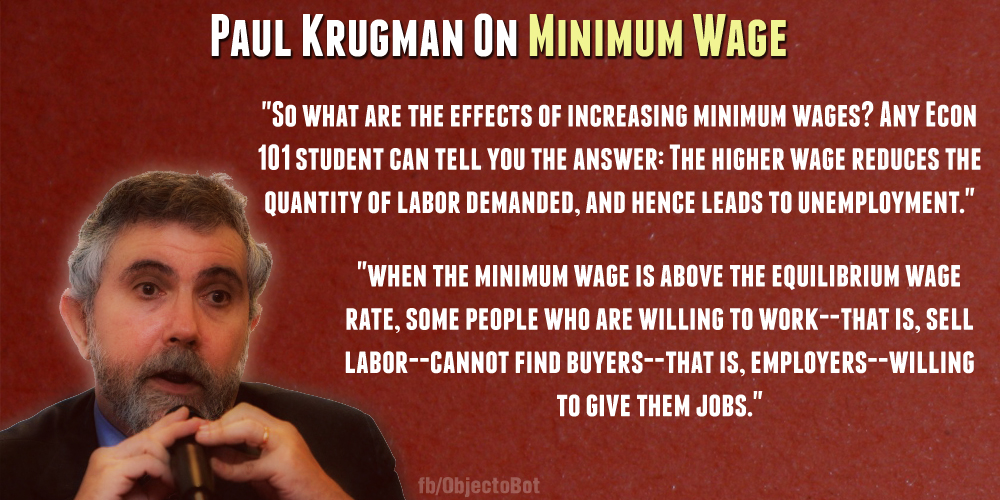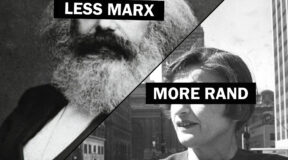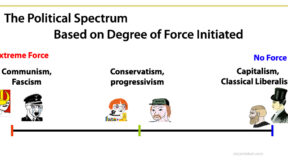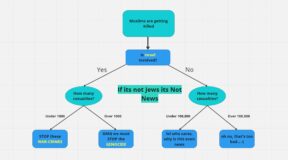
How you may ask, can Objectobot, practically a nobody, criticize and ridicule a decorated economist like Krugman in his own field. Krugman is a recognized expert in economics, why should you trust anything Objectobot has to say. I don’t expect you to trust Objectobot, just listen to the arguments and decide for yourself. As far as why I believe Objectobot can easily tangle with anything Krugman has to say? It is because Krugman has long ago, given up any superior knowledge, expertise, or logical thinking abilities he may have had. He has lowered his commentary to a level where an undergraduate with just economics 101 under his belt can easily point out the flaws. Objectbot is far above the economics 101 level, but if you still need a known authority to validate the ideas that are going to be presented, there is plenty of economists you can turn to. Thomas Sowell, and Milton Friedman just to name a few, and Robert Murphy who by the way has been trying to debate Krugman with no avail.
Let’s turn to Krugman’s comments on the minimum wage. First, he admits that raising the minimum wage to $20 an hour would be a disaster.
“Economics 101 tells us to be very cautious about attempts to legislate market outcomes…setting a minimum wage of, say, $20 an hour would create a lot of problems.”
On the other hand, he thinks setting the minimum wage at $9 an hour will have positive impacts.
“… there are strong reasons to believe that the kind of minimum wage increase the president is proposing would have overwhelmingly positive effects.”
One would think that if economics 101 teaches that a $20 minimum wage has disastrous negative impacts, that a $9 minimum wage would have the same impacts except to a smaller degree. And in fact, economics 101 does teach that, even in Krugman’s own books.
“The actions of labor unions can have effects similar to those of minimum wages, leading to structural unemployment…unionized workers earn higher wages and more generous benefits than non-union workers with similar skills. The result of these increased wages can be the same as the result of the minimum wage: labor unions push the wage that workers receive above the equilibrium wage. Consequently, there are more people willing to work at the wage being paid than there are jobs available. Like a binding minimum wage, this leads to structural unemployment.” -Paul Krugman
Notice how Krugman does not claim he knows what wage levels would and would not lead to structural unemployment in his textbook comments. However, since Obama’s state of the union speech, apparently, he has had some sort of epiphany, where it was revealed to him that $9 is the true equilibrium minimum wage. The truth is you can’t change the laws of economics any more than you can change the laws of physics. If the equilibrium minimum wage is truly $9 then forcefully raising it there may not have many negative impacts, but it will also produce very few positive ones. However, if $9 is not the equilibrium minimum wage then as Krugman himself explains it will lead to structural unemployment At any rate, any forced minimum wage always inevitably leads to some increase in workers who cannot be employed. If you are an unskilled worker, and your contribution is only $8 an hour, then no one is going to hire you for $9.
Krugman goes on to claim that a minimum wage increase is deserved.
“…in real terms, the minimum wage is substantially lower than it was in the 1960s. Meanwhile, Changes in worker productivity.” worker productivity has doubled. Isn’t it time for a raise?”
I have a problem with such arbitrary statements. Worker productivity has doubled it’s true, however, the types of jobs that are performed are completely different. So it is comparing apples and oranges. If workers really do deserve a raise, wouldn’t the wages naturally rise to a level in line with Krugman’s opinion? And if they don’t deserve a raise then forcefully increasing the wage anyway would still just lead to structural unemployment. So in the context of economic laws, what is the point of even making this argument? What does one’s opinion on whether someone deserves a raise have to do with the resulting economic impacts? This is pure emotionalism, they deserve a raise and that is it, consequences be dammed. The fact that people who are supposed to get a raise in this scenario won’t even be employed is of no concern, my intentions are good.
Krugman then goes on what can only be called a, the republicans are evil tirade.
“…Republican leaders clearly feel disdain for low-wage workers. in the eyes of the G.O.P.: “takers,” members of the contemptible 47 percent who, as Mitt Romney said to nods of approval, won’t take responsibility for their own lives.”
Actually, all that Mitt Romney said is that they are more likely to vote for Obama due to the financial benefits he promises. Taking responsibility for their own lives is something Krugman added himself, which begs the question, who in fact feels disdain? Considering that republicans believe that minimum wage laws hurt the poor. And since the laws of economics that Krugman himself describes in his textbooks suggest that republicans are right, shouldn’t we be asking Krugman why he hates the poor so much? Why is it any of his business anyway?
“If I am willing to accept work for $8 and an employer is willing to pay me $8, what in the world justifies Krugman (or a Washington bureaucrat) sticking his nose in and declaring that our desires are irrelevant, and he is going to decide what’s best for us?” – Don Watkins –





2 Comments
VioletVal
(October 30, 2013 - 5:05 am)“One would think that if economics 101 teaches that a $20 minimum wage has disastrous negative impacts, that a $9 minimum wage would have the same impacts except to a smaller degree.”
You are assuming that the relationship between the minimum wage and its impacts is a linear relationship. It could very well be a curved relationship in that if there would be negative impacts if the minimum wage is set too high or too low. I understand that economic theory teaches that a higher minimum wage always leads to higher unemployment, but this theory is contradicted by reality when real wages are taken into account. The following web address leads to an article entitled “The Minimum-Wage Debate in Charts,” which shows that historically, increases in the minimum wage adjusted for inflation were actually associated with decreased unemployment: http://www.newyorker.com/online/blogs/johncassidy/2013/02/the-case-for-a-higher-minimum-wage.html.
admin
(November 16, 2013 - 9:00 pm)You are looking at employment correlation to minimum wage on to big of a macro scale. Employment in the 1960s could of been rising due to other factors, while still being hindered by the high minimum wage.